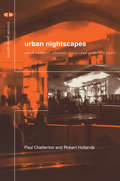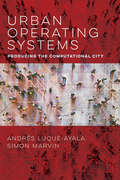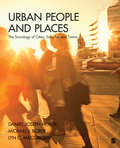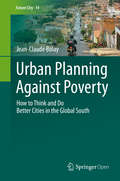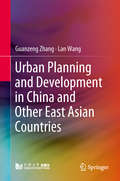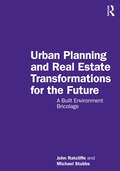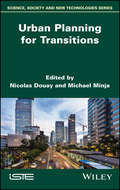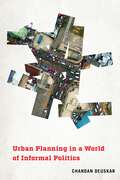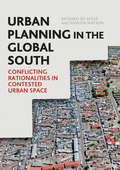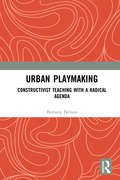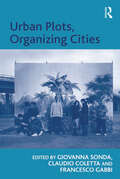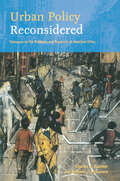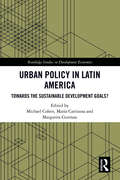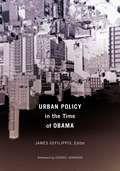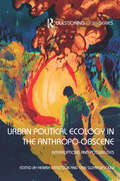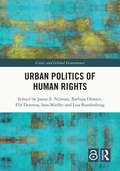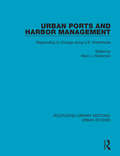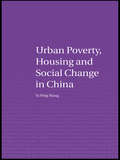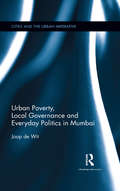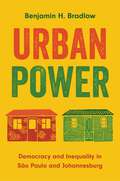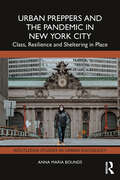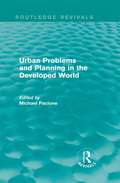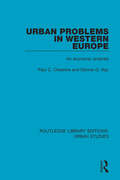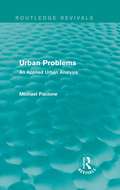- Table View
- List View
Urban Nightscapes: Youth Cultures, Pleasure Spaces and Corporate Power
by Paul Chatterton Robert HollandsIn many western cities, urban nightlife is experiencing a 'McDonaldisation', where big branded names are taking over large parts of downtown areas, leaving consumers with an increasingly standardised experience. This book takes a new look at this rapidly changing aspect of urban life, examining the relationships between young adults, nightlife and city spaces. It focuses on what the authors call 'urban nightscapes' - both mainstream and alternative youthful cultural activities in bars, pubs, night-clubs and music venues, which occur against a backdrop of increasing corporate influence in the night-time economy.
Urban Operating Systems: Producing the Computational City (Infrastructures)
by Simon Marvin Andres Luque-AyalaAn exploration of the modest potentials and serious contradictions of reconfiguring urban life through computational operating systems.A new wave of enthusiasm for smart cities, urban data, and the Internet of Things has created the impression that computation can solve almost any urban problem. Subjecting this claim to critical scrutiny, in this book, Andrés Luque-Ayala and Simon Marvin examine the cultural, historical, and contemporary contexts in which urban computational logics have emerged. They consider the rationalities and techniques that constitute emerging computational forms of urbanization, including work on digital urbanism, smart cities, and, more recently, platform urbanism. They explore the modest potentials and serious contradictions of reconfiguring urban life, city services, and urban-networked infrastructure through computational operating systems.
Urban People and Places: The Sociology of Cities, Suburbs, and Towns
by Lyn C. Macgregor Daniel J. Monti Dr Michael Ian BorerDaniel Monti, Michael Ian Borer, and Lyn C. Macgregor provide a thorough and comprehensive survey of the contemporary urban world that is accessible to students with Urban People and Places: The Sociology of Cities, Suburbs, and Towns. This new title will give balanced treatment to both the process by which cities are built (i.e., urbanization) and the ways of life practiced by people that live and work in more urban places (i.e., urbanism) unlike most core texts in this area. Whereas most texts focus on the socio-economic causes of urbanization, this text analyses the cultural component: how the physical construction of places is, in part, a product of cultural beliefs, ideas, and practices and also how the culture of those who live, work, and play in various places is shaped, structured, and controlled by the built environment. Inasmuch as the primary focus will be on the United States, global discussion is composed with an eye toward showing how U.S. cities, suburbs, and towns are different and alike from their counterparts in Africa, Asia, and Central and South America.
Urban Planning Against Poverty: How to Think and Do Better Cities in the Global South (Future City #14)
by Jean-Claude BolayThis open access book revisits the theoretical foundations of urban planning and the application of these concepts and methods in the context of Southern countries by examining several case studies from different regions of the world. For instance, the case of Koudougou, a medium-sized city in one of the poorest countries in the world, Burkina Faso, with a population of 115.000 inhabitants, allows us to understand concretely which and how these deficiencies are translated in an African urban context. In contrast, the case of Nueve de Julio, intermediate city of 50.000 dwellers in the pampa Argentina, addresses the new forms of spatial fragmentation and social exclusion linked with agro export and crisis of the international markets. Case studies are also included for cities in Asia and Latin America. Differences and similarities between cases allow us to foresee alternative models of urban planning better adapted to tackle poverty and find efficient ways for more inclusive cities in developing and emerging countries, interacting several dimensions linked with high rates of urbanization: territorial fragmentation; environmental contamination; social disparities and exclusion, informal economy and habitat, urban governance and democracy.
Urban Planning and Development in China and Other East Asian Countries
by Lan Wang Guanzeng ZhangThis book examines urban development and its role in planning in China and other Asian cities. Starting with a substantial narrative on the history, development philosophy, and urban form of ancient Asian cities, it then identifies the characteristics of urban society and different phases of development history. It then discusses urbanization patterns in China with a focus on spatial layout of the city clusters in the Yangtze River Delta since the 20th Century. Lastly, it explores institutional design and the legal system of urban planning in China and other Asian cities. As a textbook for the “Model Course in English” for international students listed by the Ministry of Education in China, it helps international researchers and students to understand urban development and planning in Asian cities.
Urban Planning and Real Estate Transformations for the Future: A Built Environment Bricolage
by John Ratcliffe Michael StubbsThis book presents fresh ways of thinking about the future for all those involved in conceiving, planning, designing, funding, constructing, occupying and managing the built environment, to face the challenges, and grasp the opportunities, that lie ahead over the next few decades. Four major themes form the basis of the volume: (1) Future Awareness and a New Sense of Place. (2) Global Governance and Anticipatory Leadership. (3) Innovation, Reform and Exemplars. (4) Urban Planning and Real Estate Transformations. Within these structural themes are a diverse range of 'Discourses' addressing many of the big questions and driving forces that face us, together with a proposed methodology (Strategic Foresight) and an array of practical illustrations viewing what can be done today – whether by organisations, individuals, cities or communities – to positively shape a preferred future and manipulate us towards achieving it. It will be important reading for students, practitioners, agencies and corporations across the built environment, especially in the fields of urban planning, real estate development, architecture, civil engineering and construction.
Urban Planning and Real Estate Transformations for the Future: A Built Environment Bricolage
by John Ratcliffe Michael StubbsThis book presents fresh ways of thinking about the future for all those involved in conceiving, planning, designing, funding, constructing, occupying and managing the built environment, to face the challenges, and grasp the opportunities, that lie ahead over the next few decades. Four major themes form the basis of the volume:(1) Future Awareness and a New Sense of Place.(2) Global Governance and Anticipatory Leadership. (3) Innovation, Reform and Exemplars. (4) Urban Planning and Real Estate Transformations. Within these structural themes are a diverse range of 'Discourses' addressing many of the big questions and driving forces that face us, together with a proposed methodology (Strategic Foresight) and an array of practical illustrations viewing what can be done today – whether by organisations, individuals, cities or communities – to positively shape a preferred future and manipulate us towards achieving it. It will be important reading for students, practitioners, agencies and corporations across the built environment, especially in the fields of urban planning, real estate development, architecture, civil engineering and construction.
Urban Planning for Transitions
by Nicolas Douay Michael MinjaToday, as cities undergo rapid and dynamic transformations, riddled with uncertainties about the future, the roles of urban planning and urban planners lie in one of these new crossroad moments. Climate change, urban migration, social inclusion, health emergencies and financial and economic crises have elevated urbanization to newer heights of complexity that can only be tackled by integrating a multitude of scenarios, strategies and discourses, in order to create an urban future that is resilient and sustainable. Urban planners have come up with transition proposals and concepts that they hope will be able to respond to cities' challenges and ultimately allow them to adapt and make the transition into more robust urban areas. This book presents and discusses various urban transition strategies, action plans and programs that have been proposed or even conducted in different countries all over the world. Different countries require different strategies, but they all have the same goal in mind, each of them trying to address urban complexities and cope with the rapid pace at which the world is evolving.
Urban Planning in a World of Informal Politics (The City in the Twenty-First Century)
by Chandan DeuskarIn many rapidly urbanizing countries in Africa, Asia, and Latin America, local politics undermines the effectiveness of urban planning. Politicians have incentives to ignore formal urban plans and sideline planners, and instead provide urban land and services through informal channels in order to cultivate political constituencies (a form of what political scientists refer to as “clientelism”). This results in inequitable and environmentally damaging patterns of urban growth in some of the largest and most rapidly urbanizing countries in the world. The technocratic planning solutions often advocated by governments and international development organizations are not enough. To overcome this problem, urban planners must understand and adapt to the complex politics of urban informality.In this book, Chandan Deuskar explores how politicians in developing democracies provide urban land and services to the urban poor in exchange for their political support, demonstrates how this impacts urban growth, and suggests innovative and practical ways in which urban planners can try to be more effective in this challenging political context. He draws on literature from multiple disciplines (urban planning, political science, sociology, anthropology, and others), statistical analysis of global data on urbanization, and an in-depth case study of urban Ghana.Urban planners and international development experts working in the Global South, as well as researchers, educators, and students of global urbanization will find Urban Planning in a World of Informal Politics informative and thought-provoking.
Urban Planning in the Global South: Conflicting Rationalities In Contested Urban Space
by Vanessa Watson Richard De SatgéThis book addresses the on-going crisis of informality in rapidly growing cities of the global South. The authors offer a Southern perspective on planning theory, explaining how the concept of conflicting rationalities complements and expands upon a theoretical tradition which still primarily speaks to global ‘Northern’ audiences. De Satgé and Watson posit that a significant change is needed in the makeup of urban planning theory and practice – requiring an understanding of the ‘conflict of rationalities’ between state planning and those struggling to survive in urban informal settlements – for social conditions to improve in the global South. Ethnography, as illustrated in the book’s case study – Langa, a township in Cape Town, South Africa – is used to arrive at this conclusion. The authors are thus able to demonstrate how power and conflict between the ambitions of state planners and shack-dwellers, attempting to survive in a resource-poor context, have permeated and shaped all state–society engagement in this planning process.
Urban Playmaking: Constructivist Teaching with a Radical Agenda
by Bethany NelsonThis book explores the concept of playmaking and activism through three research projects in which culturally and linguistically diverse high school students and young adults created original theatre around the issues that inform their lives and constrain their futures. Each study discussed by the author is considered through the lens of one or more best practices. The outcomes of the playmaking experiences, communicated through detailed ethnographic data and the voices of student participants, make a strong case for using what we already know about teaching to positively impact gross inequities of outcome for culturally and linguistically diverse students. This study will be of great interest to students, scholars, and practitioners in Applied Theatre, Theatre Education, and Art Therapy.
Urban Plots, Organizing Cities
by Claudio ColettaBy focusing on the interplay between material, social and narrative dimensions of the city, this book examines urban complexity, namely the dynamic and entangled nature of urban issues, and puts forward a notion of the city as an urban texture. Taking an innovative interdisciplinary approach, it perceives the way cities are organized as a restless stratification of materials, meanings and uses, and deals with the interrelationships between actors, places, administrative rationalities and artefacts. It argues that urban fabric is 'manufactured' in this interplay between imagery and practices (of all the stake-holders, including planners, city managers and city users). Illustrated by in-depth empirical studies from across Europe and Latin America, the book explores material and symbolic aspects of the urban experience. In particular, the contributors focus on the less visible ways of organizing urban spaces, such as those enacted and embodied by local news, artefacts such as signals, maps, regulations, public acts, artistic performances, sensory experience and collective memories. The book offers an articulated discussion on these various means of spatial organisation, thereby providing insights into situations of conflict and proposing innovative ways forward for enhancing urban sociability.
Urban Policy Reconsidered: Dialogues on the Problems and Prospects of American Cities
by Charles Euchner Stephen McGovernIn the past decade, America has experienced an urban renaissance. Cities as varied as New York, Chicago and Boston are no longer seen as ungovernable and doomed to crime and blight. However, they still face formidable problems. Urban Policy Reconsidered is a comprehensive overview of the issues and problems facing our cities today and cover every important issue in urban affairs. What is poverty? What is economic development? What is education? What is crime? As well as covering all of these fundamental topics in-depth, the author propose a communitarian approach to addressing the many problems of our cities. This book will be the manual for anyone interested in understanding urban policy.
Urban Policy in Latin America: Towards the Sustainable Development Goals? (Routledge Studies in Development Economics)
by Michael Cohen María Carrizosa Margarita GutmanThis book evaluates the impact of 20 years of urban policies in six Latin American countries: Argentina, Brazil, Chile, Colombia, Ecuador and Mexico. It argues that evaluating the fulfillment of past commitments is essential for framing and meeting the new commitments that were taken in Habitat III over the next 20 years. Taken as a whole, the book provides a critical assessment of the economic, social and environmental consequences of urban interventions during Habitat II. The country-level chapters have been written by recognized experts in urban issues, with first-hand knowledge of the Habitat process, and deep familiarity with the problems, statistics, actors and political contexts of their nations. The latter part of the volume considers wider topics such as the Habitat Commitment Index, the New Urban Agenda and the regional and global-scale lessons that can be extracted from this group of countries. Urban Policy in Latin America will be of interest to advanced students, researchers and policymakers across development economics, urban studies and Latin American studies.
Urban Policy in the Time of Obama (Globalization and Community #26)
by James DeFilippisWith his background as a community organizer and as a state legislator representing Chicago&’s South Side, Barack Obama became America&’s most &“urban&” president since Teddy Roosevelt. But what has been his record in dealing with the issues most impacting our metropolitan areas today? Looking past the current administration, what are the future prospects of the nation&’s cities, and how have they been shaped by our policies in this century? Seeking to answer these questions, the contributors to Urban Policy in the Time of Obama explore a broad range of policy arenas that shape, both directly and indirectly, metropolitan areas and urbanization processes. This volume reveals the Obama administration&’s surprisingly limited impact on cities, through direct policy initiatives such as Strong Cities, Strong Communities, Promise Neighborhoods, and Choice Neighborhood Initiatives. There has been greater impact with broader policies that shape urban life and governance, including immigration reform, education, and health care.Closing with Cedric Johnson&’s afterword illuminating the Black Lives Matter movement and what its broader social context says about city governance in our times, Urban Policy in the Time of Obama finds that most of the dominant policies and policy regimes of recent years have fallen short of easing the ills of America&’s cities, and calls for a more equitable and just urban policy regime. Contributors: Rachel G. Bratt, Tufts University; Christine Thurlow Brenner, University of Massachusetts Boston; Karen Chapple, University of California, Berkeley; James Fraser, Vanderbilt University; Edward G. Goetz, University of Minnesota; Dan Immergluck, Georgia Tech; Amy T. Khare, University of Chicago; Robert W. Lake, Rutgers University; Pauline Lipman, University of Illinois at Chicago; Lorraine C. Minnite, Rutgers University–Camden; Kathe Newman, Rutgers University; Deirdre Oakley, Georgia State; Frances Fox Piven, City University of New York; Hilary Silver, Brown University; Janet Smith, University of Illinois at Chicago; Preston H. Smith II, Mount Holyoke College; Todd Swanstrom, University of Missouri–St. Louis; Nik Theodore, University of Illinois at Chicago; J. Phillip Thompson, MIT.
Urban Political Ecology in the Anthropo-obscene: Interruptions and Possibilities (Questioning Cities)
by Erik Swyngedouw Henrik ErnstsonUrban Political Ecology in the Anthropo-obscene: Interruptions and Possibilities centres on how to organize anew the articulation between emancipatory theory and political activism. Across its theoretical and empirical chapters, written by leading scholars from anthropology, geography, urban studies, and political science, the book explores new political possibilities that are opening up in an age marked by proliferating contestations, sharpening socio-ecological inequalities, and planetary processes of urbanization and environmental change. A deepened conversation between urban environmental studies and political theory is mobilized to chart a radically new direction for the field of urban political ecology and cognate disciplines: What could emancipatory politics be about in our time? What does a return of the political under the aegis of equality and freedom signal today in theory and in practice? How do political movements emerge that could re-invent equality and freedom as actually existing socio-ecological practices? The hope is to contribute discussions that can expand and rearrange critical environmental studies to remain relevant in a time of deepening depoliticization and the rise of post-truth politics. Urban Political Ecology in the Anthropo-obscene will be of interest to postgraduates, established scholars, and upper level undergraduates from any discipline or field with an interest in the interface between the urban, the environment, and the political, including: geography, urban studies, environmental studies, and political science.
Urban Politics of Human Rights (Cities and Global Governance)
by Barbara Oomen Janne E. Nijman Sara Miellet Elif Durmuş Lisa RoodenburgIncreasingly, urban actors invoke human rights to address inequalities, combat privatisation, and underline common aspirations, or to protect vested (private) interests. The potential and the pitfalls of these processes are conditioned by the urban, and deeply political. These urban politics of human rights are at the heart of this book. An international line-up of contributors with long-term engagement in this field shed light on these politics in cities on four continents and eight cities, presenting a wealth of empirical detail and disciplinary theoreticalisation perspectives. They analyse the ‘city society’, the urban actors involved, and the mechanisms of human rights mobilisation. In doing so, they show the commonalities in rights engagement in today’s globalised and often deeply unequal cities characterised by urban law, private capital but also communities that rally around concepts as the ‘right to the city’. Most importantly, the chapters highlight the conditions under which this mobilisation truly contributes to social justice, be it concerning the simple right to presence, cultural rights, accessible housing or – in times of COVID – health care. Urban Politics of Human Rights provides indispensable reading for anyone with a practical or theoretical interest in the complex, deeply political, and at times also truly promising interrelationship between human rights and the urban.
Urban Ports and Harbor Management: Responding to Change along U.S. Waterfronts (Routledge Library Editions: Urban Studies)
by Marc J. HershmanThe essays in this book, first published in 1988, explore the changes that have occurred in the modern harbour in the 1970s and 1980s and the many roles of the public port in stimulating or responding to these changes. The goal of this study is to understand the modern harbour and public port and the contemporary pressures on them. The contributors’ disciplines range among geography, law, business, political science, and marine affairs.
Urban Poverty, Housing and Social Change in China (Housing and Society Series)
by Ya Ping WangEconomic reform in China has resulted in a widening gap between the rich and the poor, and urban poverty has emerged as a key factor which may affect future development. This new book examines the poverty problem in relation to housing and social changes in large inland cities, and assesses the effectiveness of recent government anti-poverty policies. The book also puts the Chinese experience in the wider context of transitional economies and discusses the similarities and differences between China and Central and Eastern European countries. The book is based on a long period of research on Chinese urban development, and benefited from several research projects conducted in Chinese cities. It is an important reference for all of those interested in housing, urban studies and social change, and is a key text for students of the Chinese economy and society.
Urban Poverty, Local Governance and Everyday Politics in Mumbai (Cities and the Urban Imperative)
by Joop de WitThis book explores the informal (political) patronage relations between the urban poor and service delivery organisations in Mumbai, India. It examines the conditions of people in the slums and traces the extent to which they are subject to social and political exclusion. Delving into the roles of the slum-based mediators and municipal councillors, it brings out the problems in the functioning of democracy at the ground level, as election candidates target vote banks with freebies and private-sector funding to manage their campaigns. Starting from social justice concerns, this book combines theory and insights from disciplines as diverse as political science, anthropology and policy studies. It provides a comprehensive, multi-level overview of the various actors within local municipal governance and democracy as also consequences for citizenship, urban poverty, gender relations, public services, and neoliberal politics. Lucid and rich in ethnographic data, this book will be useful to scholars, researchers and students of social anthropology, urban studies, urban sociology, political science, public policy and governance, as well as practitioners and policymakers.
Urban Power: Democracy and Inequality in São Paulo and Johannesburg (Princeton Studies in Global and Comparative Sociology)
by Benjamin H. BradlowWhy some cities are more effective than others at reducing inequalities in the built environmentFor the first time in history, most people live in cities. One in seven are living in slums, the most excluded parts of cities, in which the basics of urban life—including adequate housing, accessible sanitation, and reliable transportation—are largely unavailable. Why are some cities more successful than others in reducing inequalities in the built environment? In Urban Power, Benjamin Bradlow explores this question, examining the effectiveness of urban governance in two &“megacities&” in young democracies: São Paulo, Brazil, and Johannesburg, South Africa. Both cities came out of periods of authoritarian rule with similarly high inequalities and similar policy priorities to lower them. And yet São Paulo has been far more successful than Johannesburg in improving access to basic urban goods.Bradlow examines the relationships between local government bureaucracies and urban social movements that have shaped these outcomes. Drawing on sixteen months of fieldwork in both cities, including interviews with informants from government agencies, political leadership, social movements, private developers, bus companies, and water and sanitation companies, Bradlow details the political and professional conflicts between and within movements, governments, private corporations, and political parties. He proposes a bold theoretical approach for a new global urban sociology that focuses on variations in the coordination of local governing power, arguing that the concepts of &“embeddedness&” and &“cohesion&” explain processes of change that bridge external social mobilization and the internal coordinating capacity of local government to implement policy changes.
Urban Preppers and the Pandemic in New York City: Class, Resilience and Sheltering in Place (Routledge Studies in Urban Sociology)
by Anna Maria BoundsDrawing on urban and community resilience literature, Urban Preppers and the Pandemic in New York City: Class, Resilience and Sheltering in Place offers a detailed qualitative analysis of the impact of the COVID-19 pandemic on New York City and on the philosophy and practices of the city’s urban prepper subculture.With a special focus on the height of the pandemic in New York, this book considers the city’s unique position as the pandemic’s first epicenter in the United States. It also explores the lived experience of enduring the pandemic as reflections of class division, considering key themes, including the exodus of the wealthy, sheltering in place for the middle class, the inability to leave high-risk neighborhoods for the poor, and sheltering-in-place practices and community resilience efforts by New York preppers. It analyzes the importance of good government and an engaged citizenry in developing an agenda for the city’s continued recovery and its future, underscoring the need for cities to develop disaster management approaches that expand traditional “command and control” models to make space for local knowledge and resources.At its core, Urban Preppers and the Pandemic in New York City: Class, Resilience and Sheltering in Place is about understanding New York City’s pandemic experience and how self-reliance evolves into community resilience outside of institutions. It is vital reading for scholars and students of sociology, anthropology, geography and urban studies with interests in subcultures, ethnography and the sociology of disasters.
Urban Problems and Planning in the Developed World (Routledge Revivals)
by Michael PacioneThis edited collection, first published in 1981, presents a discussion of the urban problems faced in the developed world, and addresses the plans and policies devised by governments to solve them. Using a number of city-based case studies, including New York, Tokyo and Glasgow, the authors present a thorough analysis of urban problems and planning in relation to varying economic, cultural and political conditions throughout the developed world. With a detailed general survey from Michael Pacione, this is a comprehensive and relevant guide, which will be of particular value to students and scholars of urban planning and geography.
Urban Problems in Western Europe: An Economic Analysis (Routledge Library Editions: Urban Studies #7)
by Paul C. Cheshire Dennis G. HayThis major study, first published in 1989, examines Western Europe’s urban problems in unprecedented breadth and depth. It is a synthesis of research which had three main aims: to establish an informed view of the state of urban Europe in the most systematic and consistent way possible; to investigate document and analyse the various causes of urban problems; and to analyse general trends and similarities, as well as discovering what was local and particular. This book should prove invaluable to students, researchers and professionals concerned with urban affairs, whether they be geographers, planners, economists or policy-makers.
Urban Problems: An Applied Urban Analysis (Routledge Revivals)
by Michael PacioneUrban problems and their resolution represent one of the major challenges for planners and decision makers in the modern world. This book, first published in 1990, makes a major contribution to the field, presenting an international and interdisciplinary approach to the challenges presented by the urban environment. The coverage is comprehensive, ranging from the economic and political dimensions of the capitalist system, to the issues of poverty and deprivation and questions about housing equity. This is an essential reference guide to social, economic and environmental problems in urban areas, which is of great value to students of planning, urban studies, geography and sociology.
